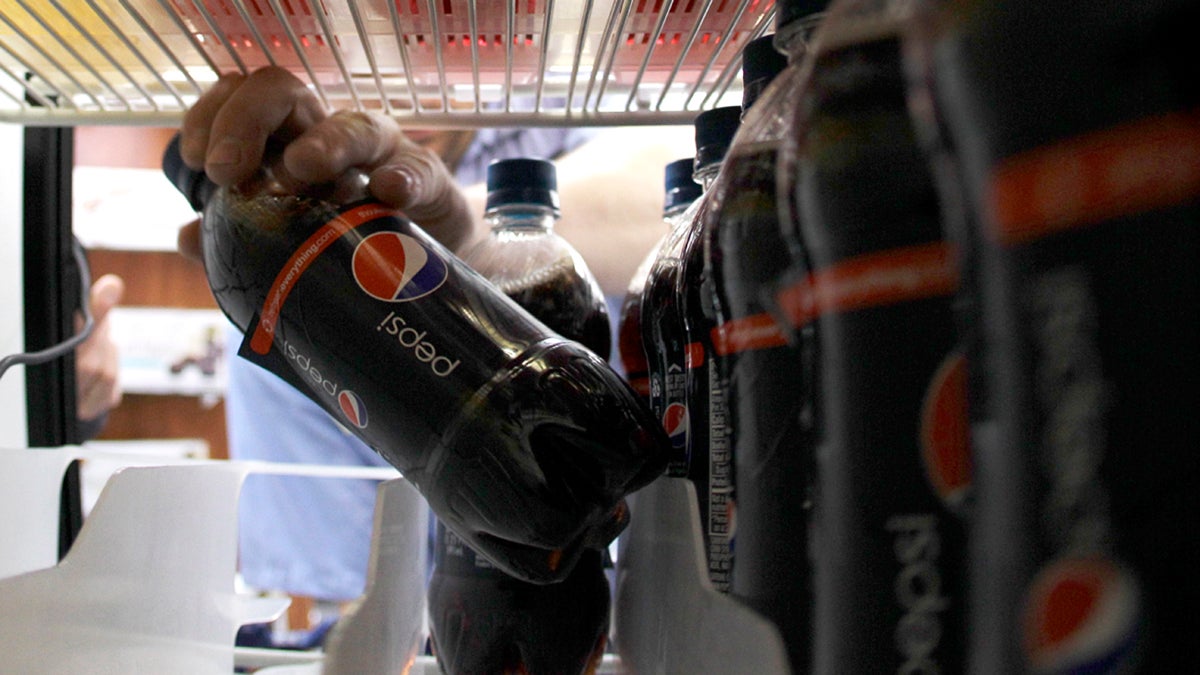Soda industry snaps back at Philly over drink tax with food stamp argument
Listen
A worker stocks a cooler with soda. (AP Photo/Ted S. Warren
There’s one legal attack in the American Beverage Association’s lawsuit filed on Thursday attempting to unravel Mayor Jim Kenney’s tax on soda and other sweetened drinks that caught the Kenney administration by surprise.
And the future of Kenney’s ambitious policy could hinge on how courts come down on this unanticipated swipe.
It concerns people in Philadelphia who receive food stamps. A third of the city’s residents are enrolled in the program, also known as SNAP.
Groceries purchased with food stamps, even soda, must be tax-free by law. Critics say subjecting SNAP recipients to more expensive soda because of the tax is illegal, potentially jeopardizing the city’s participation in the program. And So, the tax shouldn’t go into effect in January, argues the American Beverage Association.
About a fourth of the projected $91 million a year the tax is expected to bring in will come from SNAP purchases, the association predicts.
“That is a huge problem for the city in every way,” said attorney Shanin Specter, who is representing the soda industry and other plaintiffs in the suit. “Legally and optically.”
Lawyers working on the city’s response declined to comment.
Specter has filed an emergency petition to the Pennsylvania Supreme Court known as a king’s bench motion asking the high court to take the issue up now since it has “immediate public importance.” The city has until Thursday to response to the motion.
Hosea Harvey, a Temple University professor who teaches public health law, said as a matter of public policy, the soda industry’s argument has some credence.
“People who are SNAP-eligible would be paying substantially more as a result of levied taxes for an item that is supposed to be tax-free at the consumer level,” Harvey said.
But Harvey also pointed out that the Kenney administration is levying the 1.5-cent-per-once tax on distributors, not on products sold in stores. The city designed the tax this way intentionally to avoid the state’s technical definition of a sales tax.
Harvey said the distinction is important.
“Because the SNAP participants would still not be paying a consumer tax on sugary drinks under the city’s proposed sugary drinks tax. That does not raise a compelling conflict with SNAP policy as it currently stands,” Harvey said.
Nonetheless, the soda industry, he said, is underlining a point that should not be forgotten.
“I am, in some ways, pleased that the ABA has chosen to raise that as a legal argument, because it reminds us that — even if it’s a lawful tax — it doesn’t mean that it doesn’t have collateral consequences for people of low income,” Harvey said.
‘Distinction without difference’
The soda industry calls the city’s insistence that the tax is not really a sales tax a distinction without difference.
When retailers pay more to distributors for soda, what usually happens? The price of soda goes up. It becomes baked in to the cost.
Zach Cowan, city attorney in Berkeley, California, which has a soda tax structured like the one passed in Philadelphia, thinks the self-interest of the soda industry needs to be questioned.
“When an industry denies that they are exercising that choice in order to say, ‘Oh, look at this bad thing that is happening, that’s terrible, judge, please stop it.’ And at the same time, denying the fact that they’re the ones who are doing it,” he said. “There’s got to be something wrong with that.”
In other words, the soda industry is saying the tax will definitely be passed off to consumers, but they’re the ones making that choice, Cowan said.
But the cost of soda went up in Berkeley after the tax; if the same happens in Philadelphia, there’s another public policy quandary, the soda industry argues. A lot of federal dollars, through food stamps, would be feeding into city coffers every time a sweetened drink is purchased.
But Bob Inman, an economics professor at the University of Pennsylvania, said that’s not unusual. It happens all the time. For instance, let’s say a tenant received a federal housing voucher for an apartment, and the landlord’s property taxes were just raised.
“A property tax will raise rents, cut into the federal government voucher, and, in much the same way, reduce the benefits associated with the SNAP argument,” Inman said. “So, for them to make that argument, it just raises complications all over the place for all kinds of federal programs that benefit local residents.”
Discretion of distributors in play
Inman said that the soda industry’s argument that a sales tax and a tax on distributors are essentially the same thing is incorrect.
“The distributor has an option to shift those costs onto all of his product lines, so it can be shifted onto water,” Inman said. “In fact, what you do economically, you shift it on to the commodity that has the least responsive demand to the higher price, so it’s not at all analogous to a retail sales tax which is uniform across all products. This is open to the total discretion of the distributor.”
Attorneys working with the city hoping to make sure the soda tax survives this legal challenge haven’t publicly addressed the SNAP issue. But Philadelphia officials have said they did their legal homework before proposing the tax, and that they expect it to be upheld.
Kenney, who called the soda industry’s legal challenge repugnant, said the programs the soda tax will fund — expanded high-quality pre-kindergarten for the city’s kids and improvements to parks and libraries — would benefit hundreds of thousands of Philadelphians.
“Over a four-month campaign, the Kenney administration clearly explained the benefits of this tax and the programs it will fund, especially for our low-income population,” Kenney spokeswoman Lauren Hitt said. “City Council concurred and voted to support the tax in a 13-4 decision. We are confident the tax will stand up against any legal challenge.”
WHYY is your source for fact-based, in-depth journalism and information. As a nonprofit organization, we rely on financial support from readers like you. Please give today.




